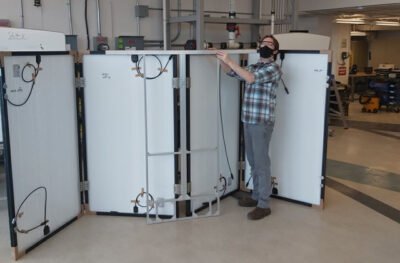Student part of team recognized for off-grid internet project
By Alejandra Pulido-Guzman - Lethbridge Herald on January 4, 2022.
 Submitted photo
Jacob Maxwell is part of a team of students that has won the Capstone Project of the Year Award.
Submitted photo
Jacob Maxwell is part of a team of students that has won the Capstone Project of the Year Award.LETHBRIDGE HERALDapulido@lethbridgeherald.com
A Lethbridge College student is part of a former team of NAIT students that has won the Capstone Project of the Year Award, from the Association of Science and Engineering Technology Professionals of Alberta (ASET).
“We were all very excited and honoured by the importance of winning this award, and what it means for the project itself. The recognition that it grants is tremendous for helping to the adaptation of this sort of thing,” said Jacob Maxwell, award recipient team member.
Maxwell, who is currently enrolled in the Wind Turbine Technician program at Lethbridge College, worked with his former NAIT Alternative Energy Technology and Wireless Systems Engineering Technology teammates, to develop a cost-effective and environmentally friendly way to utilize new technologies to deliver internet access to off-grid and remote communities.
“There’s a really definable need for such a project a very strong possibility that a lot of people in remote communities in various parts of the world are going to be well served by this,” said Barry Cavanaugh, ASET CEO.
Maxwell explained that his team accomplished this using a wirelessly distributed Starlink-based solution with a custom solar battery power supply for off-grid use,” said Maxwell.
He said Starlink is a broadband internet system produced by Elon Musk’s company, SpaceX, that is launching thousands of satellites to build the Starlink internet relay mega-constellation of Internet relay points in low-earth orbit.
“By utilizing a Starlink user terminal as the core of a wireless internet service provider network, this concept system can provide Internet access to up to approximately 100 people in a small village area,” said Maxwell.
Maxwell said they could not acquire a Starlink unit, as they were just in a beta stage of development when his team was working on the project and there were no satellites to provide coverage.
“So, instead we created a mock starlink unit and actually sends a data logging device to someone who owns a starlink,” said Maxwell.
He said they also had the Wireless Systems Engineering Technology team understand and test the capabilities of the wireless ISP units, which would run on a landline or a utility Internet system, much like a standard router would.
“We tested a range of what our software predicted would be required. We wanted to understand the software that was developed by the national renewable energy laboratories in Colorado,” said Maxwell.
He said the one in the United States provided a range of what solar and battery power would be required for these systems.
“We model that and then tested those models for accuracy and came to a range of conclusions, based on the positioning abilities of the software to determine what is required anywhere in the world,” said Maxwell.
Maxwell said that even though this concept could be applied to areas anywhere in the world, they would need a consistent solar power accessibility.
“The thing is that solar power in particular if it’s the only power source the cost scales exponentially as you anticipate reliability,” said Maxwell.
He explained that a battery energy storage would required and would have to run for days, weeks or even potentially months with no sunlight if it was in a location north of the Arctic Circle, .
“One can see that as the sunlight becomes less consistently… for off grid systems that solely rely on solar power source it becomes much more expensive to just use batteries and energy storage in these locations,” said Maxwell.
Maxwell explained that the project was fuelled by the importance of having access to the internet.
“Is not only important for social connection and entertainments but it’s also acquiring a vast array of knowledge,” said Maxwell.
He added that it has been proven that Internet access supports economic growth in remote communities.
“Suddenly craftspeople and farmers have a window to sell their goods and services in locations where they might have just simply had one buyer, so it does create an opportunity for individuals of remote communities to increase their earning potential,” said Maxwell.
Cavanaugh said that these projects demonstrate exactly what goes on with engineering technologists what they are training to do in the colleges and polytechnics across the province.
“Engineering technologists do in my view, is practical engineering so they address a problem and resolve it in a very practical way,” said Cavanaugh.
A team of former Civil Engineering Technology students from Lethbridge College was among the six other finalists for the prestigious award.
The award itself was established by ASET in 2017 in response to overwhelming member interest in Capstone Projects undertaken by teams of engineering technology students from NAIT, SAIT, Red Deer College, and Lethbridge College as part of their end-of-program requirements.
Follow @APulidoHerald on Twitter
4-3




